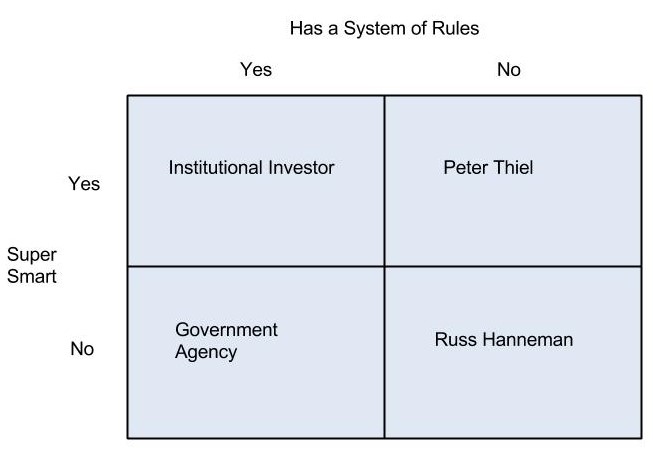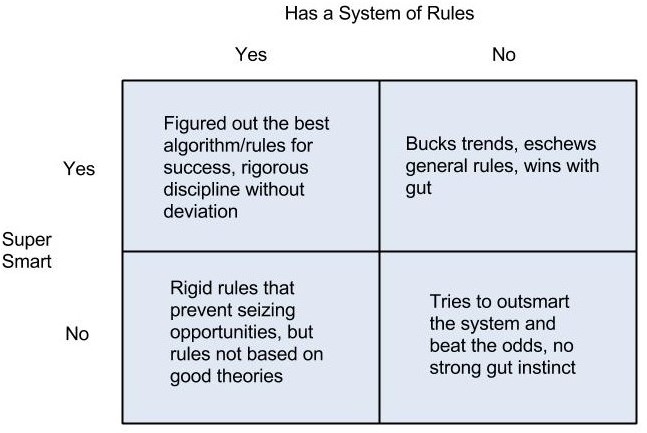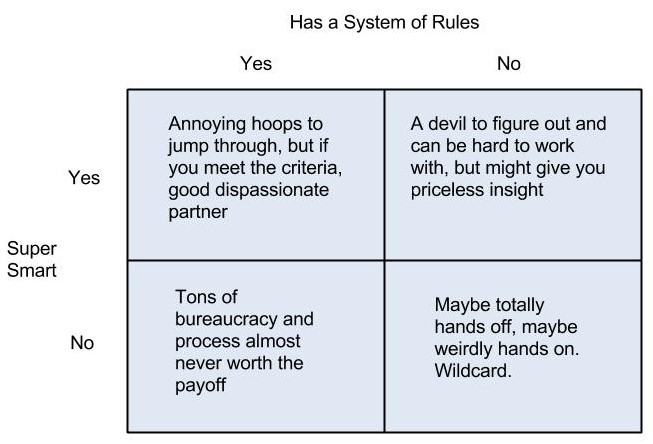It’s possible you’re preparing for an economy that no longer exists. Let’s explore five common myths and mistakes when it comes to getting educated, building a resume, landing a job, and starting off on the right foot in the professional world.
Fallacy #1: You can’t turn down “free” opportunities
Things too good to resist can be dangerous.
So many young people suffer through stuff they don’t like with no clear future benefit just because everyone else calls it a great opportunity, or something they’d be crazy to turn down. “If you get in to an Ivy, you go!”, or, “If Goldman offers you a job, you take it!”, or, “If your parents will pay for this expensive education, you can’t walk away from that free experience!”.
But it’s not free. Every action has an opportunity cost – what other things you’re giving up in order to do it – and money is the least important. “Free” comes with strings attached, just like your parents money. Most unhappy young students and workers are unhappy because they feel like they can’t turn down something someone offered them. You can. In fact, you probably should.
The more skin you have in the game, the more likely you are to succeed. Watch students who are paying their own way through a school or educational program.
Watch people who pay to go to conferences or professional development trainings out of their own rather than their companies pocket. Consider books you buy for yourself vs. those gifted to you. Which do you get more out of?
There’s a reason Bruce Wayne couldn’t climb out of the prison until he tried it without the rope. There’s a reason Vegas is better than experts at predicting sports outcomes. When you have something of your own to lose, you sharpen your focus and perform your best. Place a bet on yourself. Put yourself in positions where you stand to lose or gain based on your failure or success.
Don’t do things you don’t like doing just because they are “free”. It can tether you to the expectations of others and make you a worse decision maker.
Make it a goal to become independent of the goodwill of others and dependent on your own success as soon as possible, even if that means turning down opportunities others would salivate over. They don’t have to live your life. You do.
Fallacy #2: You major matters
What you know matters. What you study in school not so much. (With the exception of legally required majors for heavily regulated industries).
All the most valuable things you’ll learn in life won’t come from a classroom. How to walk, talk, drive, use Google, navigate social situations, and creatively solve problems are learned by doing. The most important ideas you’ll deal with are more likely to come from your own experience, reading, and discussing than from assignments. You can’t outsource the development of knowledge to a department, program, or credential.
Studies and majors won’t automatically grant you useful knowledge, nor will they provide a deep and rich network. We all need one. A pool of people with whom we’ve established social capital, and who we can work with and call on for resources, expertise, and support is indispensable. It’s not uncommon for a university experience to provide you with some friends and future associates, but never assume just being around a bunch of other students with similar interests is enough. That’s a recipe for building a horizontal network, not a vertical one. You need both.
A network of people mostly the same age with mostly the same interests at mostly the same skill and experience level is a start, but only a very small start. You need to step outside the institutional setting and build a network that includes retired pros, middle-aged managers, young investors, old experts, and an array of people up and down the world of enterprise across a diverse set of industries.
Fallacy #3: “Leadership” is a skill
In the real world product beats paper every time.
I read a lot of resumes from people who clearly obsess over them. They are spattered with a diverse array of activities and list vague skills like, “Leadership”, and “Integrity”. These don’t indicate anything but an obsession with credentials and titles. You’ve got to demonstrate value creation.
Resumes and degrees are signals. Their only purpose is to let you broadcast that you pass some minimum bar of intelligence and ability. They can’t do much more, and increasingly, they don’t even do well at that minimum signal. Activities are not outcomes. Anyone can join a club or be named treasurer. Few can actually create value in a demonstrable way. The latter crushes the former every time.
Can you show something you’ve actually “shipped”? Do you have an easily verifiable reputation for getting stuff done? Show, don’t tell. Show them the website you built. Show them the number of new page likes your Facebook ad campaign generated. Let them see the customers you served, the money you raised, the newsletter you produced, or the app you launched.
Whether any of these tangible creations succeeded is far less important than whether you finished them. Everyone can sign up for stuff and spout about ideas.
Everyone can pass a class. Very few can deliver results on time. Almost no one can conceive an idea and bring it to life without being forced to be some authority figure.
Focus less on the resume and more on the product.
Fallacy #4: There is one right path
Most likely your future job doesn’t exist yet. Don’t stress about it, this is a good thing.
It’s ridiculously painful to decide what your calling in life is, and what educational and career steps you must take to live it.
Relax. There isn’t a single path that, if missed, will doom you forever. You’re travelling to a largely unknown destination.
How can you plan for that? Simple: don’t try to do what you love, just try to avoid what you don’t.
Make a list of things you really don’t like, aren’t good at, and don’t even really want to be good at. Anything not on that list is fair game. Go try it. When you discover through experience more things you dislike, add them to the list. Pretty soon the field of viable options will begin to narrow. Any step within that field is a step in the right direction.
Fallacy #5: You are an employee
Machines and software are better employees than humans. So what.
You’ve got one amazing advantage: humans are wonderfully creative and adaptive. Use it. You can’t afford the employee mindset, where you simply specialize, follow orders, and expect your company to do the heavy lifting when it comes to your financial support, happiness, and reputation. You are your own firm, wherever your paycheck may come from.
You’ve got to think like an entrepreneur.
Take ownership of the company vision, whether you created it or not. Understand that you’re not just laying bricks, but building a cathedral. Ask questions. Look for ways to improve, even things outside of your department or direct control. Do one thing to add value to yourself and your company every single day.
This doesn’t mean you should ever consider yourself too good for old fashioned grunt work. Ask any entrepreneur if they’ve ever done their own data entry or toilet scrubbing. They have. It does mean you have to adopt a big-picture mindset and don’t wait for assignments, but look for ways to create value. Whenever possible, just do them rather than asking permission.
As the market changes demand for whatever specialized skills you have may grow or shrink. The one thing that will always be in demand is creative problem solvers who think big and act swiftly.
Conclusion
What does combating all these myths have in common? You can’t wait around for other people to confer status, knowledge, or success on you.
You’ve got to take the reins and build your own education and career, and it all begins with a mindset shift.
Like this:
Like Loading...


